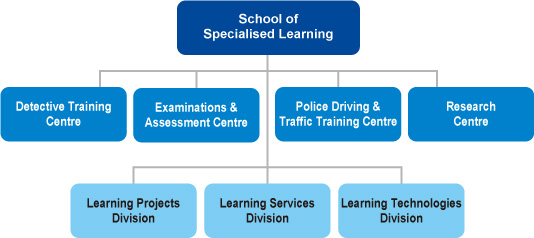
Introduction
The School of Specialised Learning, headed by a Senior Superintendent, comprises four subsidiary Centres and three functional divisions, viz. Detective Training Centre, Police Driving and Traffic Training Centre, Research Centre and Examinations and Assessment Centre, Learning Projects Division (LPD), Learning Technologies Division (LTD) and Learning Services Division (LSD). The School aims to professionalise the learning initiatives and to effectively develop the Force’s competencies and individual capabilities.
The School provides a wide range of specialised and generic competency training such as detective training, police driving and traffic training, language training and instructors’ training.
The School also plays a vital role in providing the following services:
- Enhance the Force’s research capabilities to support the delivery of high quality services to the community with the assistance of the Research Centre.
- Deliver professional consultancy and support services to ensure that learning and development initiatives are effective, efficient and value for money.
- Develop and implement a quality assurance mechanism that embraces the assurance of professional qualities of trainers to enhance continuous professionalisation of learning and development initiatives.
- Advance training effectiveness by application of modern learning technologies acquired through open market, internal self-development and collaborated development with external institutions.
- Develop projects in support of the Force priorities, other Force-wide and Police College initiatives as well as to cultivate the culture of lifelong and personal ownership of learning.
- Conduct Force examinations and assessments to ensure training effectiveness and vocational competence of Force members including Auxiliary police officers.
